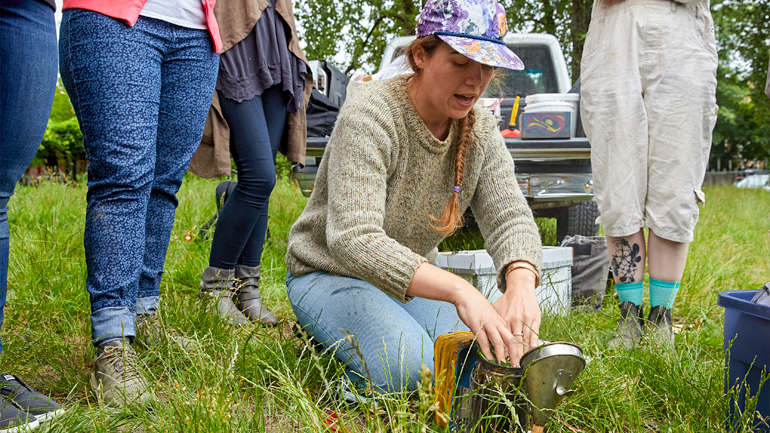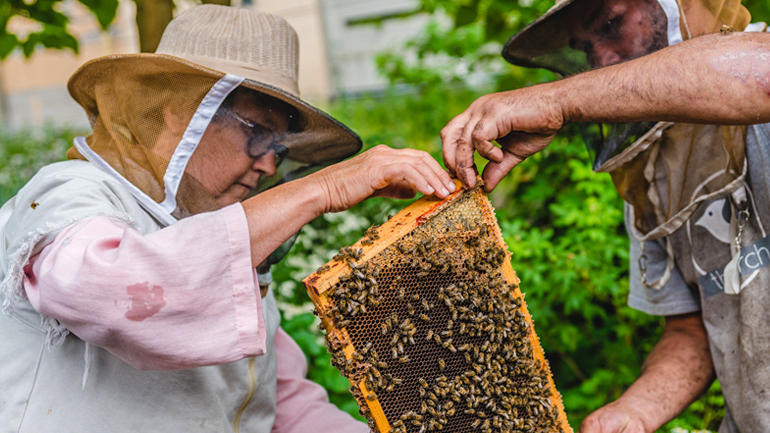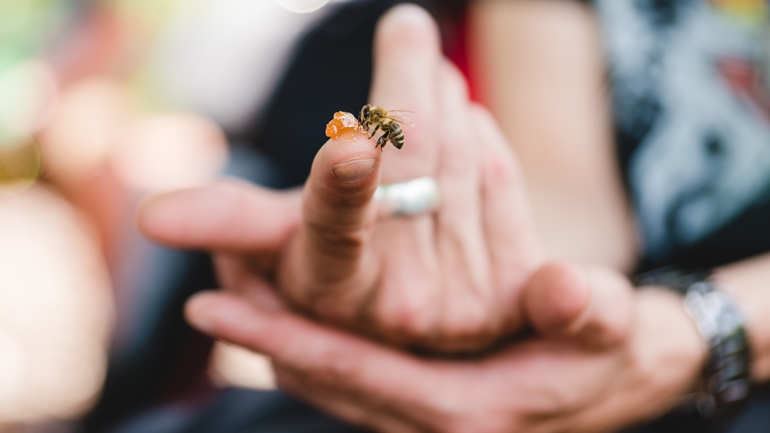In Vancouver's Downtown East Side, one of Canada's poorest postal codes, a man in his 40s arrives at the community garden he volunteers at, helping maintain it for the thousands of bees that rely on the wild flowers to produce honey.
The man (whose identity is anonymous for privacy reasons), has been gardening, collecting seeds and cleaning frames from the hives each week for Hives for Humanity—a non-profit organization that began in Vancouver's Downtown Eastside (DTES) in 2012 to help cultivate a sense of community, belonging and self-worth for members of the neighbourhood's homeless and at-risk residents.
Three years ago, the man started attending drop-in programs. "At the beginning, he avoided eye contact and conversation," says Sarah Common, the Co-Founder and Chief Executive of Hives for Humanity. "He preferred to sit and watch the bees carrying pollen, flying in and out of the hives as they worked in the garden."
Overtime, Common began noticing small shifts in the man's attitude.

Sarah Common, the Co-Founder and Chief Executive of Hives for Humanity preparing a bee smoker.
"Once he started caring for the hives, he opened up to staff and other volunteers. We knew that he had value and skill, that he was creative and thoughtful, and through beekeeping and a connection with nature he found a way to share this with others. He now comes here to work with us weekly," says Common, adding the organization now oversees more than 200 hives across the Greater Vancouver Area – business rooftops to parking lots - in addition to managing three pollinator gardens.
Common says beekeeping not only produces delicious honey and sought-after wax candles but creates opportunities for at-risk populations (residents who may be homeless or struggling with mental health or addictions) to develop valuable work skills, relationships and confidence.
"In times of poverty and homelessness," says Common, "people are often left feeling isolated and without a safety net. The use of the gardens is therapeutic because you must be calm and gentle when handling bees. It helps volunteers feel less alone."
In 2018, Hives for Humanity was awarded one of the inaugural TD Park People Grants, designed to support community events happening in Canadian green spaces. Common used the grant to host three walks through the organization's community gardens. Last summer, the walks were led by community gardeners and residents of the DTES to showcase the positive work taking place in the neighbourhood, and to combat stigma. And an opportunity for gardeners to connect with nature, spurring a curiosity and appreciation for the natural world.
"The grant helps support the positive, truly transformative social and environmental work being done by Hives for Humanity," says Carolyn Scotchmer, TD Bank Group. "It is one way TD is working with the private, public and not-for-profit sectors to develop more connected and sustainable communities, and to encourage inclusion through our corporate citizenship platform, The Ready Commitment."

Hives for Humanity volunteers have an opportunity to build skills, gain meaningful experience and foster supportive relationships through the therapeutic beekeeping program.
For Common, witnessing the growing self-confidence of volunteers who often arrive struggling to cope with anxiety and fear, and who are often told they don't matter, is directly correlated to working with bees.
"When you're working with honeybees it really doesn’t matter what your job title is, what your bank statement says, or where you may have tried finding shelter the night before," says Common. "All that matters is how you’re connecting with them in helping them do their job."
The TD Park People Grants is accepting applications for 2019 until March 4th. For more information, visit www.parkpeople.ca.
